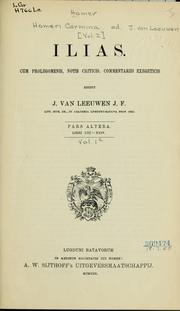Ancient Greek language
Published Nov. 8, 1912 by A.W. Sijthoff.

Ancient Greek language
Published Nov. 8, 1912 by A.W. Sijthoff.
An account, in the form of an epic poem written in dactylic hexameter, long thought to be pure Greek mythology, of a Bronze-Age conflict between the Greeks of Sparta, and those of Troy, in Phrygia, (in modern times, northwestern Anatolia, Turkey). Attributed to a sightless poet simply known as Homer, of which little is known, this epic poem was most probably created over several centuries, perhaps during the so-called Geometric Age (c. 900-700 BCE), by many authors in an oral tradition, before the adoption of writing, when it was not uncommon to be able to recite (or sing), verbatim, book-length poetic works, which were passed down by recitation over generations.
Eventually, when the Greeks adopted and modified the Phonecian alphabet for their own language, the Iliad (literally, 'The Saga [or Song] of Ilium') took on a codified, written form around 735±25 BCE. Since then it has been rendered in countless …
An account, in the form of an epic poem written in dactylic hexameter, long thought to be pure Greek mythology, of a Bronze-Age conflict between the Greeks of Sparta, and those of Troy, in Phrygia, (in modern times, northwestern Anatolia, Turkey). Attributed to a sightless poet simply known as Homer, of which little is known, this epic poem was most probably created over several centuries, perhaps during the so-called Geometric Age (c. 900-700 BCE), by many authors in an oral tradition, before the adoption of writing, when it was not uncommon to be able to recite (or sing), verbatim, book-length poetic works, which were passed down by recitation over generations.
Eventually, when the Greeks adopted and modified the Phonecian alphabet for their own language, the Iliad (literally, 'The Saga [or Song] of Ilium') took on a codified, written form around 735±25 BCE. Since then it has been rendered in countless versions and translations from ancient times to the present and remains one of the earliest and most well-known works of Western literature.
From this tale spring the legends of the beautiful Helen of Troy ('the face that launched a thousand ships'), swift-footed Achilles, the Trojan Horse, the humiliation of Hector and such memorable literary tropes as 'the rosey fingers of dawn'.
Famously, Alexander the Great (358-323 BCE), slept with a copy of the Iliad under his pillow and his campaign of revenge against the Persian Empire may have been motivated in part by his identification with the heroic exploits of Achilles.
In the 19th century, Heinrich Schliemann (1822-1890) was inspired to prove the reality of the Iliad, although his methods and results have been highly criticized, he did much to establish that a Trojan War, in one form or another, had probably acted as the initial inspiration for the Iliad.